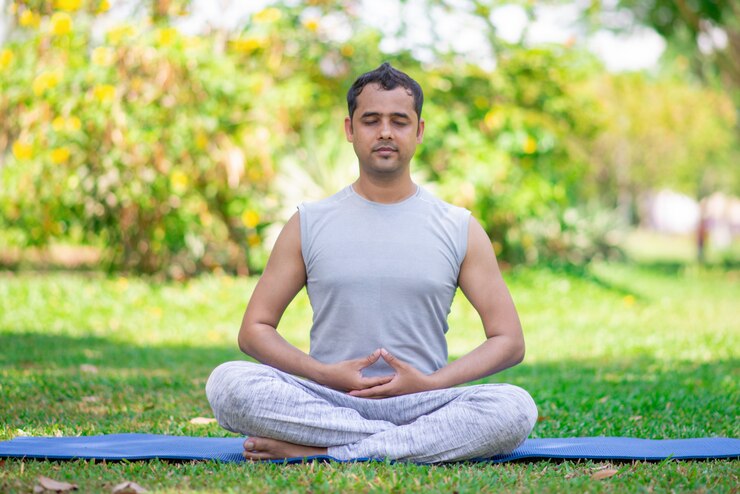Have you felt like shutting your mind off during stressful times? To just think about nothing at all? The more you focus on thinking about nothing, the more you start thinking about everything.
Seriously, it is so hard to do it. Try doing it now, close your eyes for 30 seconds and think about nothing. I bet you won’t be able to. “I have this task to finish today, it’s pretty hot out, what am I going to eat for lunch?”
Meditation helps you do just that. It’s not a magic bullet, neither requires you to be a spiritually inclined individual or go to the terrains of the Himalayas to do it.
Yet not many of us are able to do it regularly. Why? Because our mind will start to wander off to an endless stream of unhelpful thoughts without even realising it.

Give it a try once
Take a moment. Slow down. Breathe. As you read this, become aware of yourself reading this sentence. You, sitting there, focusing on each word, one by one. Can you hear yourself reading this in your mind? If you’re doing the reading, who’s doing the listening?
With the above paragraph, you just became aware of your thoughts and mental processing for 15 seconds. Meditation allows one to observe thoughts and emotions by keeping themselves out of it.
Doing it for as little as 5 minutes a day can make you happier and healthier. Doing it for 30 minutes a day can change your life.
Practice, don’t perfect
Before you start meditating, here are 3 basics you need to know:
1. First time meditators, shift your focus from perfection (meditating for longer hours at a time) to practicing it every day, starting with 90 seconds to as short as 5 minutes.
2. Everyone, from children to senior citizens can meditate. It is the easiest personal development tool available. It’s free of cost. Practice it, learn it and master it.
3. There is no right or wrong way to meditate. The key is to find what works best for you.


5 most effective techniques of meditation for beginners
1. Self: Close your eyes, focus on your breath and pay attention to each part of your body.
2. Guided: This involves following a set of instructions from a trained teacher. It helps to anchor and prevent the mind from wandering.
3. Visualisation: Close eyes and focus on an imaginary place/image/scene that allows you to feel peaceful and happy.
4. Movement: Be present and aware of your body. As you walk in the park or practice Yoga, this can be done anytime of the day, anywhere.
5. Yoga Nidra: It is a state of conscious sleeping, doing nothing physically but awake mentally. Avoid falling asleep during this practice.
Quick tips for beginners
1. Find a comfortable space to sit, lie down, walk or stand.
2. Wear comfortable, breathable clothes so you can sit without feeling restricted. 3. Try to meditate at the same time every day.
4. Set a timer. This will help you to not worry about time and focus on your meditation.
5. Start small. Start with shorter guided meditations (5-15 minutes) and increase the time as you get more comfortable.
6. Wait at least 2 hours after a meal to practice meditation.
7. The best time to start meditation is after you wake up or right before going to sleep.
8. It’s completely normal for your thoughts to wander during meditation. When that happens, gently bring your attention back to your breath or the point of focus. Do this as many times as it takes.
But can meditation help you get better at your work/job?
Despite the well-known effects of meditation like self-awareness, reduced stress, productivity, attention span, here’s what else meditation can do for your work:
1. Reduce prejudice & see things more objectively.
2. Helps focus on the present & let go.
3. Allows you to be non-judgmental.
4. Counteract stress & burnout.
5. Helps stay calm in stressful situations.
6. Gain new perspective & think outside the box.
7. Form deeper relationships.
8. Alters brain structure to improve cognition & memory.
Meditation is practice, not a quick fix. It will take time, patience and consistency to see results. Give it time and let your mind absorb the process.
*Content from WoW team






